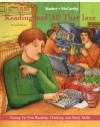

 Reading and All That Jazz: Tuning Up Your Reading, Thinking, and Study Skills, 2/e How We Learn - Finding Out About Ourselves Journal |
 2003 McGraw-Hill Higher Education
2003 McGraw-Hill Higher EducationAny use is subject to the Terms of Use and Privacy Policy.
McGraw-Hill Higher Education is one of the many fine businesses of The McGraw-Hill Companies.